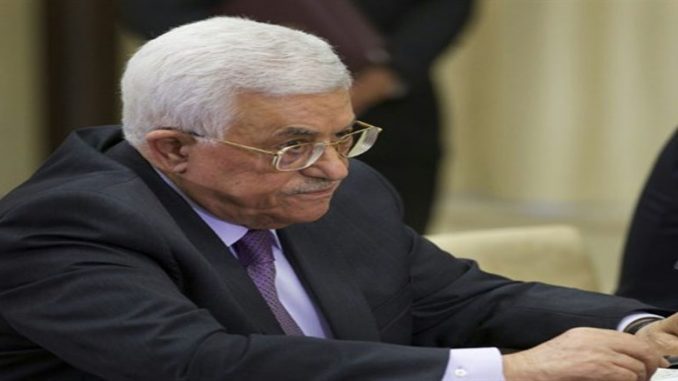Palestinian Authority (PA)- owned Wafa news agency reported Monday that Abbas explained in his letter “the destructive effects” of such a move to the peace process, to the two-state solution, as well as to general stability in the region.
According to Wafa, the letter also reminded President-Elect Trump that Israel’s annexation of occupied East Jerusalem remains illegal under international law.
Abbas also sent letters to heads of states in Russia, China, France, Germany, and Britain, as well as the European Union, the African Union, the Organization of Islamic Cooperation, the organization of Non-Aligned Movement, and the secretary-general of the Arab League.
The letters urged heads of states and organizations to “exert as much efforts as possible to prevent moving the U.S embassy to Jerusalem.”
Abbas on Friday slammed the attempts by the Republican-dominated US government to move the embassy, saying it would send the Middle East peace process and the entire world into a “crisis,” and demanded that the American administration accept UN resolution 2334, passed last month after US President Barack Obama abstained from voting, which condemned Israel’s illegal settlement expansion on occupied Palestinian territory.Abbas reiterated that East Jerusalem was the Palestinian capital, and also a holy site for the three monotheistic religions — Islam, Christianity, and Judaism — and highlighted that each has the right to access and perform religious practices in Jerusalem.
Abbas’ statement came following the introduction of a bill to Congress on Wednesday, spearheaded by three US senators — Republicans Ted Cruz (Texas), Dean Heller (Nevada), and Marco Rubio (Florida) — that would recognize Jerusalem as Israel’s undivided capital and move the US embassy there from Tel Aviv, defying international stances on the decades-old Israeli-Palestinian conflict resting on a two-state solution.
If implemented, the bill would give legitimacy to Israel’s illegal occupation of East Jerusalem since 1967, disregard Palestinian claims to the city, and possibly terminate a longstanding White House policy to perpetually defer a 1995 Congressional decision to recognize Jerusalem as the Israeli capital and move the embassy there.
Abbas invited President-elect Donald Trump to visit Palestine, particularly Bethlehem city, and urged the soon-to-be president not to make any changes to the status of East Jerusalem that rests on a two-state solution with East Jerusalem as Palestine’s capital, calling the potential legitimization of Israel’s illegal annexation of occupied East Jerusalem a “red line.”
President-Elect Donald Trump will be sworn in as the American President on Jan. 20. He pledged during his campaign that, if elected, he would ensure that the US embassy in Israel was moved to Jerusalem, with Trump’s senior adviser Kellyanne Conway reiterating last month that the move would be a “very big priority” for the Trump administration.
Abbas’ words came on the same day that the US House of Representatives approved a bipartisan resolution rejecting UN resolution 2334, and instead stated their unwavering commitment and support for the state of Israel.
The Israeli government has also openly expressed its anticipation for a Trump presidency when right-wing politicians believe they will more easily advance plans to expand Israeli settlements and consolidate Israeli annexation of East Jerusalem and other parts of the West Bank.
The fate of Jerusalem has been a focal point of the Israeli-Palestinian conflict for decades, with numerous tensions arising over Israeli threats regarding the status of non-Jewish religious sites in the city, and the “Judaization” of East Jerusalem through settlement construction and mass demolitions of Palestinian homes.
While members of the international community have rested the solution to the Israeli-Palestinian conflict on the discontinuation of illegal Israeli settlements and the establishment of a two-state solution, Israeli leaders have instead shifted further to the right as many Knesset members have called for an escalation of settlement building in the occupied West Bank, and with some having advocated for its complete annexation.


